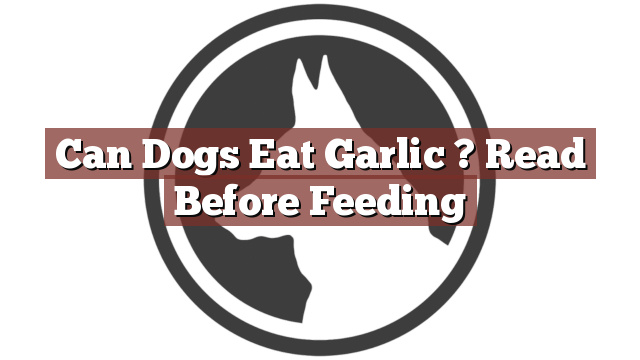Understanding Your Dog’s Dietary Needs
As a responsible pet owner, it is important to understand your dog’s dietary needs. Providing a balanced and nutritious diet is crucial for their overall health and well-being. While it is tempting to share our food with our furry companions, not all human foods are safe for dogs. Certain foods can be toxic and harmful to them, causing various health issues. Therefore, it is essential to educate yourself about what is safe and what is not when it comes to feeding your dog.
Can Dogs Eat Garlic? Read Before Feeding
Can dogs eat garlic? This is a common question that many dog owners may have. The answer is no. Garlic, along with onions and other members of the Allium family, is toxic to dogs. These foods contain compounds that can damage a dog’s red blood cells, leading to a condition called hemolytic anemia.
Although garlic is known to have certain health benefits for humans, it is important to remember that dogs have different metabolisms and digestive systems. What may be safe for us can be harmful to them. Therefore, it is best to avoid feeding garlic to your furry friend altogether.
Pros and Cons of Feeding Garlic to Dogs
While garlic should be avoided, it is worth mentioning the potential pros and cons of feeding garlic to dogs. Some proponents of natural remedies believe that small amounts of garlic can help repel fleas and ticks, boost the immune system, and promote heart health in dogs. However, these claims are not scientifically proven, and the risks associated with feeding garlic outweigh any potential benefits.
Feeding garlic to a dog, even in small quantities, can lead to serious health issues. Symptoms of garlic toxicity may include vomiting, diarrhea, weakness, pale gums, increased heart rate, and even collapse. In severe cases, it can cause organ damage or even be fatal. It is always better to be safe than sorry, and avoiding garlic is the best course of action for your dog’s health.
In Conclusion: Safely Navigating Garlic in Your Dog’s Diet
To ensure the well-being of your furry friend, it is best to avoid feeding them garlic altogether. While garlic may have some potential health benefits, the risks of toxicity far outweigh any possible advantages. Remember that dogs have different dietary needs than humans, and what may be safe for us can be harmful to them.
If you suspect that your dog has ingested garlic or any other toxic food, it is important to seek veterinary care immediately. Prompt treatment can make a significant difference in their recovery. As a responsible dog owner, it is your duty to provide a safe and appropriate diet for your pet, which does not include garlic.
Thank you for taking the time to read through our exploration of [page_title]. As every dog lover knows, our furry friends have unique dietary needs and responses, often varying from one canine to another. This is why it's paramount to approach any changes in their diet with caution and knowledge.
Before introducing any new treats or making alterations to your dog's diet based on our insights, it's crucial to consult with a veterinarian about [page_title]. Their expertise ensures that the choices you make are well-suited to your particular pet's health and well-being.
Even seemingly harmless foods can sometimes lead to allergic reactions or digestive issues, which is why monitoring your dog after introducing any new food item is essential.
The content provided here on [page_title] is crafted with care, thorough research, and a genuine love for dogs. Nevertheless, it serves as a general guideline and should not be considered a substitute for professional veterinary advice.
Always prioritize the expert insights of your veterinarian, and remember that the health and happiness of your furry companion come first.
May your journey with your pet continue to be filled with joy, love, and safe culinary adventures. Happy reading, and even happier snacking for your canine friend!

